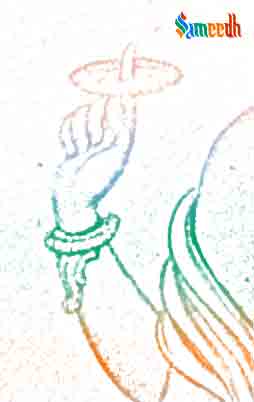Sudarshan Chakra was known as Bhagwan Vishnu’s symbol of the cycle of time during the Vedic period. It has the potential to demolish anything that comes into its path. It can rotate thousands of times per second and travel millions of yojans (12kms) in the blink of an eye.

Bhagwan Vishnu carries the Sudarshan Chakra, a Divine weapon. It’s a disc-like weapon with 108 serrated edges that keeps on rotating constantly. The Sudarshan Chakra has the potential to demolish anything that comes into its path. Sudarshan Chakra is the only weapon which always keeps moving. It has the power to execute millions of rotations per second and travel millions of yojans (12kms) in the blink of an eye. The Sudarshan Chakra is not thrown at the enemies, but rather released against them to cause destruction.
Sudarshan Chakra’s literal meaning is ‘one with auspicious vision.’ The Sudarshan Chakra was known as Bhagwan Vishnu’s symbol of the cycle of time during the Vedic period. However, it came to be known as ‘Ayudh Purush’ in the medieval era, which depicted a ferocious avatar of Bhagwan Vishnu. The middle section of the Sudarshan Chakra is divided into four parts: Sampada (nectar of nourishment), Nirdesh (speed), Bhag (radiance), and Bhruvi (equality). Prajapati devised the spokes, which are made up of twenty-seven feminine elements. It comprises the five divine components, which are known as yoginipanchak. It surpasses all dimensions and time limitations.
On one hand, it is small enough to fit on the tip of a Tulsi plant leaf and on the other hand, it is enormous enough to cover the entire universe. When the Sudarshan Chakra is launched, it destroys the enemy and comes back to the person who wielded it. The Sudarshan Chakra fully remains in the command of the person who wielded it, even after it has been released. The Chakra takes the Shunyamarg (path of emptiness) for travel thus; it can reach any location in an instant. When it is confronted with an obstruction, it accelerates itself. This speed is called ‘Hansagati’. It does not produce any sound and it possesses enormous destructive potential.
There are several ancient stories which depict the birth of this heavenly weapon Sudarshan Chakra. Some say that the collective powers of Brahma, Vishnu, and Mahesh formed it whereas, according to some traditions, Guru Brihaspati gave it to Bhagwan Vishnu. The creation of Vishnu Sudarshan Chakra is described in one classic historical account. Once upon a time, the Gods were suffering terribly at the hands of demons hence; they proceeded to seek Bhagwan Vishnu’s intervention and asked Him to protect mankind from the demons. However, Bhagwan Vishnu informed the Gods that He did not have essential weapon to fight those particular demons. Nevertheless, He assured the Gods by promising that he would seek assistance from Bhagwan Shiv and ask for a special weapon, which could defeat the demons. When, Bhagwan Vishnu went to visit Bhagwan Shiv, He discovered that Bhagwan Shiv was deeply meditating.
Bhagwan Shiv continued His meditation for many years. Eventually, many years later, Bhagwan Shiv came out of his meditative state. Upon knowing this, Bhagwan Vishnu was overjoyed. He rushed off to gather a thousand lotus flowers in order to offer them to Bhagwan Shiv and request for a boon. However, Bhagwan Shiv chose to put Bhagwan Vishnu’s devotion to a test by hiding one lotus flower. Bhagwan Vishnu realised that one flower is missing hence; Heplucked out one of his eyes and offered it to Bhagwan Shiv. Upon seeing Bhagwan Vishnu’s tremendous devotion, Bhagwan Shiv bestowed the Sudarshan Chakra upon him, which would enable Bhagwan Vishnu in defeating all the demons.
